The Death of Sandra Bland and My Fear of Driving While Black
The Root
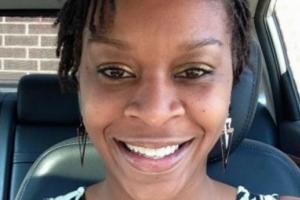 Sandra Bland died in police custody in a Texas jail after a traffic stop. In a video shot by a passer-by, Bland protests that her head is being slammed to the ground during her arrest. Local authorities are calling her death a suicide, but friends and family do not believe that explanation. Twitter users have launched the hashtag #IfIDieInPoliceCustody to counter the narratives that often follow the deaths of unarmed black men and women in police custody.
Sandra Bland died in police custody in a Texas jail after a traffic stop. In a video shot by a passer-by, Bland protests that her head is being slammed to the ground during her arrest. Local authorities are calling her death a suicide, but friends and family do not believe that explanation. Twitter users have launched the hashtag #IfIDieInPoliceCustody to counter the narratives that often follow the deaths of unarmed black men and women in police custody.
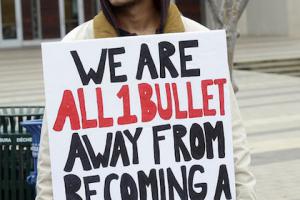 According to the Washington Post, which, in the absence of reliable government statistics, is one of the news organizations tallying the number of police killings in the U.S., cops killed some 461 people in the first six months of 2015. And, more than a fourth of those slain, the reporters say, were "in the throes of mental or emotional crisis." The Washington Post estimates that in 2015, on average, police killed one mentally disturbed person every 36 hours.
According to the Washington Post, which, in the absence of reliable government statistics, is one of the news organizations tallying the number of police killings in the U.S., cops killed some 461 people in the first six months of 2015. And, more than a fourth of those slain, the reporters say, were "in the throes of mental or emotional crisis." The Washington Post estimates that in 2015, on average, police killed one mentally disturbed person every 36 hours.
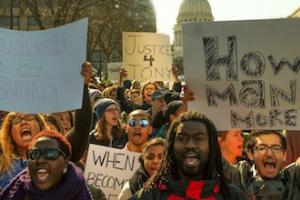 Highlighting the failure of the U.S. government to keep adequate records on the number of civilians killed by police, news outlets are now tallying the lives lost to police violence. According to a new database launched by the Guardian on Monday, local, state, and federal law enforcement agencies are killing people at twice the rate calculated by the U.S. government. The data further illustrates “how disproportionately” black Americans are killed by police.
Highlighting the failure of the U.S. government to keep adequate records on the number of civilians killed by police, news outlets are now tallying the lives lost to police violence. According to a new database launched by the Guardian on Monday, local, state, and federal law enforcement agencies are killing people at twice the rate calculated by the U.S. government. The data further illustrates “how disproportionately” black Americans are killed by police.
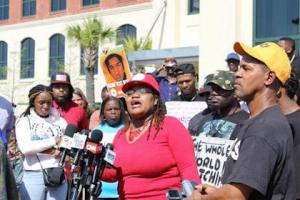 North Charleston, South Carolina, has received strong praise for its handling of the fatal police shooting of 50-year-old African American Walter Scott. According to the media, the city's quick response saved it from becoming another Ferguson, MO. But, North Charleston's response should be understood not in contrast to Ferguson but in the context of Ferguson and a national upsurge of protest against racist policing.
North Charleston, South Carolina, has received strong praise for its handling of the fatal police shooting of 50-year-old African American Walter Scott. According to the media, the city's quick response saved it from becoming another Ferguson, MO. But, North Charleston's response should be understood not in contrast to Ferguson but in the context of Ferguson and a national upsurge of protest against racist policing.
 A new report “Say Her Name: Resisting Police Brutality Against Black Women” by the African American Policy Forum (co-authored by Kimberlé Williams Crenshaw and Andrea J. Ritchie) offers the stories of girls and women—both cis- and transgender—whose names are not as well known in the mainstream and argues that fewer numbers is no excuse for erasure.
A new report “Say Her Name: Resisting Police Brutality Against Black Women” by the African American Policy Forum (co-authored by Kimberlé Williams Crenshaw and Andrea J. Ritchie) offers the stories of girls and women—both cis- and transgender—whose names are not as well known in the mainstream and argues that fewer numbers is no excuse for erasure.
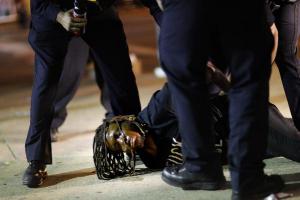 117 countries criticized, shamed and attacked the U.S. for police violence and racial discrimination at the United Nations Human Rights Council hearing in Geneva. Among the various concerns raised were the failure to close the Guantanamo Bay detention facility, the continued use of the death penalty, the need for adequate protections for migrant workers and protection of the rights of indigenous peoples.
117 countries criticized, shamed and attacked the U.S. for police violence and racial discrimination at the United Nations Human Rights Council hearing in Geneva. Among the various concerns raised were the failure to close the Guantanamo Bay detention facility, the continued use of the death penalty, the need for adequate protections for migrant workers and protection of the rights of indigenous peoples.
Spread the word